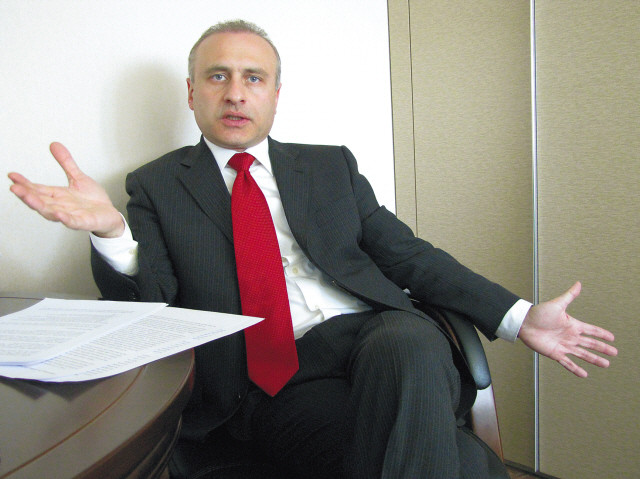Korean relations in the Caucasus could be poised for a leap forward in every area including diplomacy, energy investment, tourism and even wine imports, with the opening of an embassy in Georgia this year.
That is because Georgia, a small country strategically located at the crossroads of Europe and Asia, and between the energy-rich Caspian and Black seas, is working double-time to expand its diplomatic reach in East Asia and upgrade its bilateral ties with countries such as Japan and Korea.
In 2007 and 2008 Japan and Georgia opened embassies in each other’s capitals.
Then, Georgia opened one in Seoul in 2011, and hopes that Seoul’s plan to open an embassy in Tbilisi will soon be official.
The person behind both initiatives is a youthful Georgian diplomat who studied for years in Japan is the country’s top diplomatic representative in Korea.
“Korea still has no embassy in Georgia, but we are working very energetically on this issue. Our bilateral relationship is at a point where they understand that to lift it up to the next level, it is necessary to have direct contact on the ground in Tbilisi,” Georgian Ambassador Nikoloz Apkhazava told The Korea Herald at his office in Seoul.
After setting up an embassy in Tokyo, Tbilisi then dispatched him to Seoul to open a Georgian embassy here. Korea conducts its relations for the time being from its embassy in Baku, Azerbaijan.
Apkhazava hit the pavement running when he started his posting in February 2012, just in time for the Nuclear Security Summit, a huge diplomatic confab that saw hundreds of presidents and prime ministers converge in Seoul.
 |
Georgian Ambassador Nikoloz Apkhazava gestures during an interview with The Korea Herald at his office in Seoul, Monday. (Philip Iglauer/The Korea Herald) |
“I came to Korea in February 2012 as the first resident ambassador, and only a month after I arrived, a big delegation from Georgia including the president of Georgia and three cabinet ministers came to attend the Nuclear Summit,” he said.
At the time, Georgian President Mikheil Saakashvili met with then-President Lee Myung-bak. Last year’s meeting was the first for a Georgian head of state in Korea since two-way ties started in 1992.
They discussed a plan to build 250-megawatt and 500-megawatt hydro-electric power plants in western Georgia.
Georgia has created a robust investment climate through political and fiscal reforms. This progress is well reflected in country’s international ratings. A stable macroeconomic environment with a liberal trade regime, low taxes and ease of doing business brought the country to annual growth rates of 6-7 percent.
Tbilisi is working on normalizing relations with its northern neighbor Russia, too. Since the Russia-Georgia War in 2008, Moscow has occupied the breakaway territories of Abkhazia and Tskhinvali region (South Ossetia).
Since the conflict, Moscow has recognized them as independent states. Georgia does not recognize the new governments set up there, nor does the vast majority of the international community.
“(Our government) is now working to normalize the situation between us and Russia because, as of now, we don’t even have diplomatic relations with Russia,” Apkhazava said.
“Normalizing relations with Russia should be done, because it is our neighboring country. The new government has appointed a special representative on Russia, but there are no tangible results so far. We do, however, hope there will be some progress.”
Georgia’s foreign policy priorities, namely full integration into the EU and NATO, remain unchanged. “You can be a member of NATO and still have normal relations with Russia, as in the case of the Baltic states,” the ambassador said.
In 2012, Korea and Georgia celebrated the 20th anniversary since the establishment of diplomatic relations.
In celebration of the 20th anniversary of relations, the two countries held the first round of bilateral political consultations, followed by “Korean Culture Days” in Tbilisi, which included a Korean movie festival and a photo exhibition. A Korean fusion girls’ band called Queen even traveled to Tbilisi to perform.
Korea and Georgia still have to ink all those bilateral agreements that cement embassy-level ties and lay the legal and political foundations. They signed an intergovernmental agreement on visa-free travel for diplomats and government officials in February.
Attracting foreign direct investment is one of the issues Apkhazava is focused on, but there are scores of others that come with a new diplomatic mission. “When you start from zero you have every issue in front of you.”
Upgrading Georgian-Korean ties means promoting the country’s signature winemaking tradition, too. The world’s first cultivated grapevines are thought to have originated in the country’s fertile valleys some 8,000 years ago.
Winemaking is so tied to the national identity of Georgians that a world-recognized production method, the “Kakhetian rule,” refers to the eastern Georgian region of Kakheti.
“We are working to promote our wine in Korea, with a wine-tasting party twice last year, and we promote our wines on our national day,” Apkhazava said. Georgia plans to introduce its signature wines on Georgian Independence Day in May.
By Philip Iglauer (
ephilip2011@heraldcorp.com)








